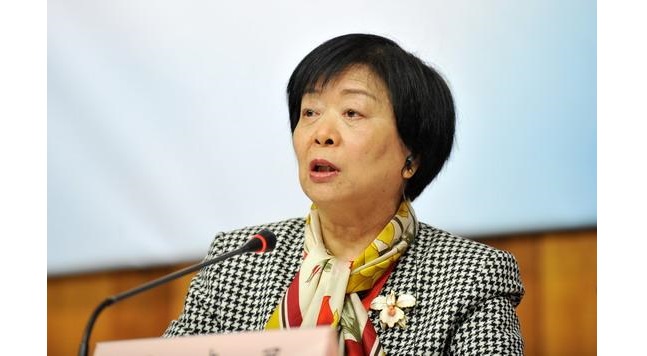The former deputy director of the People’s Bank of China has stated that virtual currency can exist in tandem with government-issued currency in a public speech.
Speaking at the Sanya Forum international finance event, Wu Xiaoling asserted that “private money in a digital form can coexist with government money” and that such a situation is “the norm in human society.”
The surprising remarks seem to be the most explicit yet to come from an official Chinese source regarding the recognition, or even legitimacy, of digital currency. At the least, they would appear to be an expansion of current deputy Xu Nuojin’s previous statement in June, in which he stated that “there is space for Bitcoin to exist” in China.
The reaction to Nuojin’s words was lukewarm, with the Chinese community playing down the idea that major change in government stance was on the horizon. BTC China CEO Bobby Lee commented to CNBC at the time, that “large breakthroughs in the concept of monetary and financial sovereignty” remained unlikely, but that lawmakers were not shutting out the idea altogether.
This time, however, the mood seems different, Lee commenting to Cointelegraph via email:
“We are very optimistic about Wu Xiaoling's published statement, and regard it as a positive signal for the Bitcoin outlook in China. Based on her comments, the PBOC has a sophisticated understanding of Bitcoin, and recognizes the power and potential of block chain technology.”
He added, “It's encouraging to see government officials who ‘get it,’ and we expect an increasingly supportive regulatory environment in China.”
The Xiaoling speech specifically makes further references to the practical implications for digital currency, including the practicalities of blockchain technology and the need for a “multiple payment agreement” governing cross-border digital currency transactions.

Xiaoling said:
“A new value transfer network based on open-source, distributed information technology will reduce costs and increase efficiency; it is worthy of exploration and development.”
Regarding “distributed cross-border payments,” the speech described them as being “the next challenger to the existing international clearing system,” which would necessitate the agreement and are “worth exploring.”
“…China has not historically been an early adopter of disruptive technology, but that is changing,” Lee wrote. “Blockchain technology has the potential to create new industries and also reshape existing industries. Policymakers who understand that want to capture as much of the market as possible, and the wealth, jobs and skills that come with it. While challenges remain, I think this bodes well for our industry.”
Lee also noted the pertinence of Xiaoling’s vocabulary, in that “private money” was most likely a specifically selected description:
“Interestingly, Wu Xiaoling used the term ‘private money,’ which is the designation used in some European countries. That suggests how Bitcoin might be regulated in China in the future.”
Meanwhile, a spokesperson from another Chinese-based exchange, LakeBTC, also commented on the news to Cointelegraph:
"Wu has a clear and accurate interpretation of cryptocurrencies, and it's in line with the policies by Chinese government in the past. They never shut the door to bitcoin companies and innovations. As a matter of fact, Chinese regulators are quite wise and open-minded to the new technology: Bitcoin is a type of commodity that people are free to own, buy, and sell.
"Wu was the deputy governor of PBOC. Now she's more like an economist and a think-tank supporting PBOC's policymaking. People still listen to what she has to say, but we should not "over-react" the importance of this speech.
"She said: '[D]igital currency must be regulated, and the transaction process should be traceable.' This statement is consistent with the opinions of most other jurisdictions. Anti-money laundering, anti-terrorism, investor/consumer protection are what regulators case most about. For example, futures trading, financial derivatives, gambling are strictly regulated in China and many other countries, and it's dangerous for traders to ignore the policy risk involved. The most important asset of an exchange is not the number of new financial products or trading volume, but the territory of the compliance, along with financial risk management and internal controls, which are exactly LakeBTC's strengths."
The move comes on the back of the setting up of a targeted activist group aimed at improving the Chinese Bitcoin environment. Dubbed the ‘Bitcoin Development Foundation,’ its creator Ryan Xu has reportedly secured the backing of several local entrepreneurs. Xu himself is relatively unknown, having been involved in Bitcoin mining since 2011 and organized the Shanghai Bitcoin Meetup.
The group’s mission statement, posted on Yibite.com, highlights five key areas identified as needing improvement in the Chinese Bitcoin environment, including support for startups and media activity.
Did you enjoy this article? You may also be interested in reading these ones:
- ‘Bitcoin Development Foundation’ Seeks a Unified Voice and Solidarity for Chinese Bitcoin Community
- Bitcoin in China – What Lies Ahead? 5 Things the US-China Commission Said about Bitcoin’s Future in
- China's "Big Three" Bitcoin Exchanges Agree that BitLicense Proposal “Could Be Very Damaging to the Industry”
